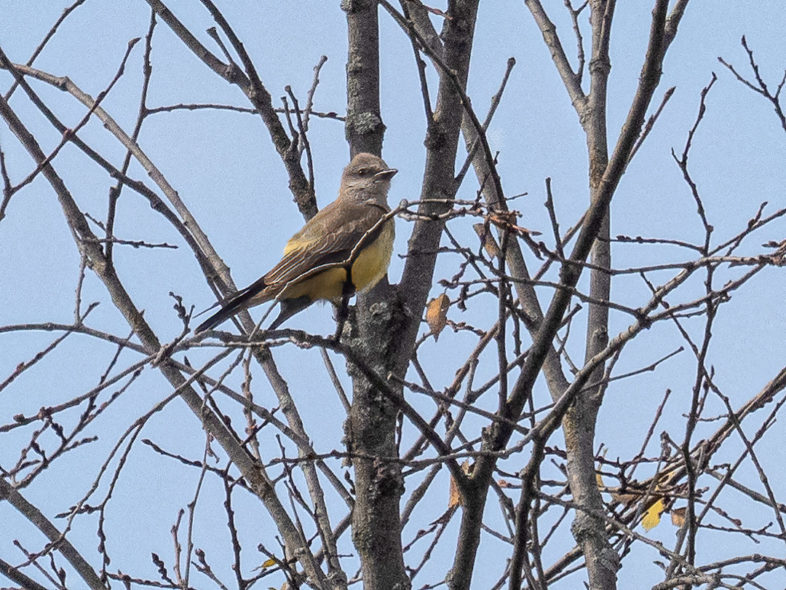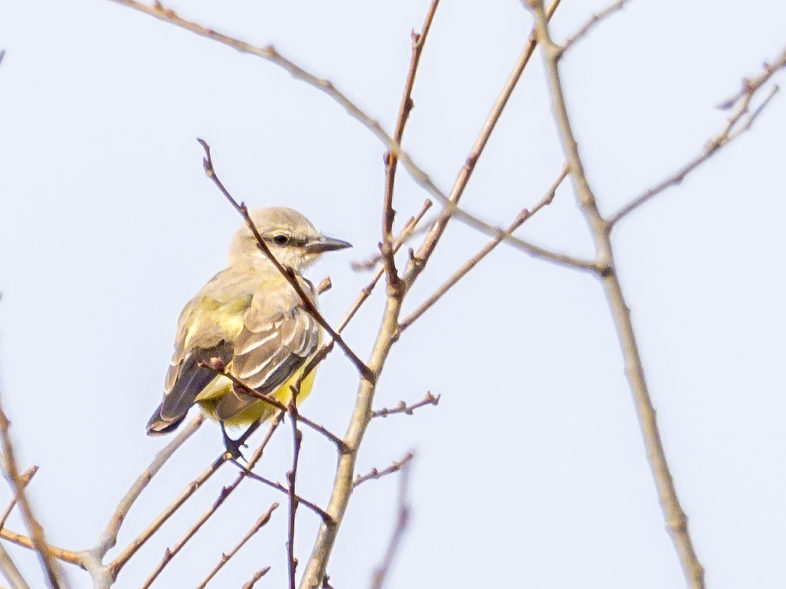
A vagrant Western Kingbird that delighted many birders on Campbell Flat Road in Norwich over 5 consecutive days in early October 2020. © Marc Beerman http://www.oldmanphotography.com/
Most birders (present company definitely included) are shameless thrill-seekers; nothing electrifies us like the unexpected appearance of a rarity. To be sure, keeping track of common species throughout the year provides plenty of motivation and reward, but few birders can claim that the prospect of a migratory overshoot, a wayward vagrant, or an out-of-season oddball doesn’t quicken the heartbeat. Once found and “staked out”, rarities tend to attract a crowd, sometimes a stampede. Crested Caracara in Woodstock, anyone? Great Black Hawk in Maine (there is now a statue in its honor!)?
Vermont is no stranger to avian surprises, but the recent appearance in Norwich of a Western Kingbird was a first for many birders, and a thrill for all who observed it. On the morning of Saturday October 3, veteran birders Kyle Jones and Tii McLane were combing Campbell Flat, one of the Upper Valley’s most reliably productive hotspots, when an unusual sight in a leafless treetop caught Tii’s eye. Binoculars revealed a large flycatcher with a pale gray head, yellow underparts from the chest down, and white outer tail feathers. Kyle snapped two cell phone photos, and the bird disappeared, not to be refound…until Monday morning, again by Kyle and Tii! At that point, it put on a terrific show for birders over the next 3 days, perching conspicuously in bare hardwood canopies, sallying out every minute or two to capture flying insects as large as dragonflies. Not everyone who ventured to Campbell Flat was able to find the bird (I needed 3 tries), but many did, and thorough photo documentation left no doubt of its presence.

Another view of the displaced Western Kingbird that graced Campbell Flat Road in Norwich during early October 2020. © Jim Block https://www.jimblockphoto.com/\
The western counterpart of our familiar Eastern Kingbird—and every bit as belligerent—Western Kingbirds are noted for their migratory eastward wandering, mainly in fall. Massachusetts alone boasts an astonishing number of records; totals by month over a 40-year period (1953—1993) were: August–15, September–176, October–129, November–157, December–44, and January–4 (Veit and Petersen 1993)! However, in Vermont, Western Kingbird is one scarce species, with this only the state’s fourth verified record — two (including this one) have been fall birds, while two have appeared in spring. So far in 2020, eBird reports a handful of displaced migrants from New England north since August; these range from Quebec’s Gaspé Peninsula and St. Lawrence River, to extreme western Nova Scotia, to the southern Maine coast, to NE Connecticut, to…east-central Vermont. From New York south to South Carolina, 10 Western Kingbirds have been found so far this fall. Why this species is especially prone to autumnal wandering is anyone’s guess.
As of this writing, the Campbell Flat Western Kingbird has not been seen since mid-morning on October 7. A sharp cold front may have caused it to move on, though East Coast records of the species in November and December lend hope that it might resurface. If not, many of us birders experienced an exhilarating brush with rarity, and we can all be thankful. Back to counting Song Sparrows and Yellow-rumped Warblers, waiting for the next unforeseen encounter!

I’ve seen only two in thirteen years in NW Washington State..I guess i’ll have to come east for more views and photos.
I had one in my backyard in May of this year. Beautiful, very loud he was singing away. That yellow belly really stood out! -Plainfield, NH
We had a bird that looked a lot like this at our feeder in the summer – Hartford, VT. I thought it was a yellow-breasted chat. Now I wonder.
I believe I have seen a flock of these less than a month ago
How do I send you photos to be sure? There must have been a couple dozen all over this old camp , they were amazing to sit and watch
WOW! I saw this bird today 6/26/21 at my feeder in Manchester VT!! I didn’t get a photo, but it was unmistakable! I will watch the feeder for sure over the next few days and keep my camera handy.
I’m far from being an expert at identifying birds, but two days ago I noticed two or three gray birds with yellow breasts in the crabapple tree outside my dining room window in Montgomery, VT. I googled the colors and found the western kingbird, but seeing that its range was the western US, I thought I must have identified the birds incorrectly. Could the identification have been correct after all?
Without a photo, it’s difficult to know the identity of the gray and yellow birds that Ken saw in his crabapple tree in Montgomery, VT. However, the species most likely to fit that description (and appear in numbers) at that time of year is the Evening Grosbeak.
I believe the western kingbird showed up in our yard today on New Boston Rd in Norwich, I was shocked when I looked up what it was and figured it wasn’t possible until I found this thread, and given the drought this summer it seems plausible! It’s been hanging out with the phoebes and smaller fly catchers all afternoon. I will try and take a picture tomorrow if it is still here!
I beleive there was a western kingbird outside my office window (kept flying into the window, maybe catching spiders?) in Williston. It definitely fit the description. Wish I took a photo…..Office coworker saw it and agreed with photos online.
I have a western king bird nesting in my backyard birdhouse here in Kennebunkport